When should you test for gut parasites or bacteria?
Medical review by
Dr Alasdair Scott MBBS FRCS PhDKey Article Takeaways
- Your healthy gut is full of bacteria, viruses, fungi and even parasites living in balance.
- Gut infection happens when this healthy balance is upset and can lead to gut symptoms.
- You can get short-term symptoms like food poisoning or travellers' diarrhoea.
- If you’ve got long-term symptoms, it’s worth taking our Gut Bacteria, Worm and Parasite Test.
While you might not think about it often, there are trillions of bugs living inside your gut. But what happens when one of these microbes starts to overgrow and upset the balance, or a harmful bug joins the bunch? We’ll explain what it means to have a gut infection when you’re already a home for many different gut bugs. We’ll go through the common gut infections, how you can pick them up, what symptoms you could have and when you need to test yourself.
What does infection mean when your gut is already full of bugs?
You’ve probably heard about the gut microbiome and how your normal, healthy gut is packed full of bacteria, viruses, fungi and parasites. You’ve got 10-100 trillion microbes in your body which make up your microbe community, or gut flora. They outnumber your own cells by 10 to 11. It’s a huge number to wrap your head around, so large that nobody’s claimed the “trillionaire” title yet. But we’re all gut microbe trillionaires!

So, if your bowel is full of bugs already, how can you have a gut infection? What’s the harm of a few more bugs? “Ah, it’s all about ‘good bugs’ and ‘bad bugs'”, I hear you say. If only it were that simple. Did you know that even so-called “superbugs” like Clostridium difficile are often part of your normal, healthy gut microbiome?
As with many things in life, the gut microbiome is all about balance. In a healthy microbiome, even bugs that have the potential to cause harm can exist and contribute to a healthy host (that’s us), so long as they’re in balance with the other bugs in your gut. However, these same bugs can cause problems if their numbers get too high. In this case, we call these bugs a pathogen - a bug that causes a disease.
Of course, there are some bugs that nearly always act as a pathogen if they get inside your gut. But often it’s more a case of “are they there in large numbers” or “are they doing something harmful”? So what are some of these gut infections?
What are common gut infections and where do you get them?
There are several common bugs that can cause gut symptoms. You’re more likely to catch them if you’re travelling or in contact with someone unwell. While it’s not nice to think about, most of these are spread via contact with infected faeces. This usually happens in areas with poor sanitation and where people aren’t properly washing their hands after using the bathroom.
Viruses
Viruses are the most common cause of symptomatic gut infections. Two of these stomach bugs are norovirus and rotavirus. Rotavirus mostly affects infants and young children, while norovirus can affect people of all ages2, 3.
Viruses can live on surfaces for many hours or days, but they need to infect a host to replicate. You can get these viruses through surfaces, food or drink contaminated with faeces or contact with an infected person4, 5.
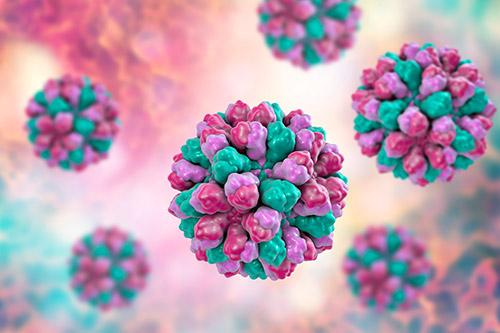
Bacteria
Escherichia coli
Bacteria are the most abundant microbes in your healthy gut. Escherichia coli is one of these bacteria and it’s a normal, harmless gut inhabitant for the most part. But E. coli is also the top cause of travellers’ diarrhoea worldwide. You can get infected by eating or drinking substances contaminated with faeces6.
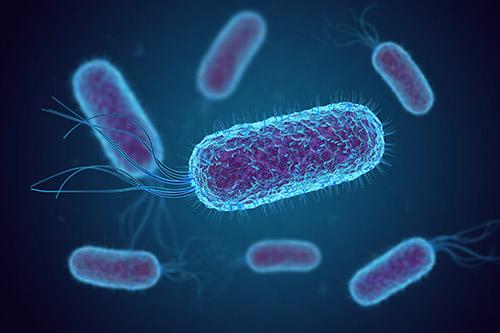
There are some types of E. coli which can produce toxic substances and make you particularly ill. One of these is toxic E. coli (also called vero cytotoxin E. coli, or VTEC). Contaminated water or food is the main way most people get toxic E. coli infection7.
Campylobacter
Campylobacter is another bacteria that can give you gut symptoms. There are lots of foods (mainly animal produce) that can be contaminated with Campylobacter, including raw or undercooked poultry and anything that’s touched it. This is usually down to traces of faeces from the infected animal or person8.
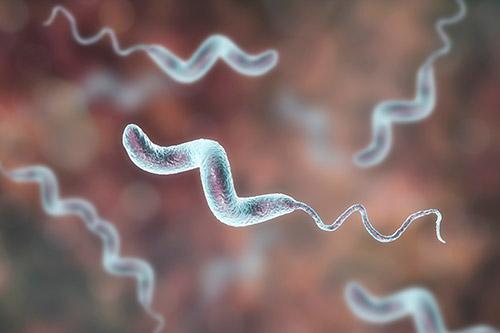
Shigella
Shigella bacterial infection is one of the leading causes of diarrhoea worldwide. Sometimes infection comes with dysentery, which is where you have blood or mucus in your diarrhoea. Most infections occur in overcrowded places with unsanitary conditions. Drinking untreated water or eating contaminated food can lead to Shigella infection. It can also be spread through sexual contact. Infected people can still be contagious for several weeks after their symptoms have ended9.
Salmonella
Salmonella is probably the one you’ve heard of before. You can catch it from raw and undercooked food, such as eggs or chicken10. Making sure your food is fully cooked is important to kill off the bugs.
It’s a good idea to wash your eggs before eating them, but if an egg has Salmonella then it can be inside the shell too. You might have noticed the “red lion” stamps (shown below) on many of your eggs. This stamp means that the eggs were produced under strict food safety guidelines. It also means the hens which laid them were vaccinated against Salmonella which may reduce the risk of Salmonella infection.
Don’t worry though - if you aren’t getting stamped eggs, cooking them until the whites and yolk are firm kills any Salmonella that is there.

Helicobacter pylori
Did you know that some bugs can cause cancer? Long-lasting infection with the bacteria Helicobacter pylori increases your risk of stomach cancer. This bacteria infects your stomach, causing indigestion, stomach inflammation and peptic ulcers. H. pylori is really common and in the UK, 15-30% of us carry it11, 12. We don’t fully understand how it passes between people yet, but it’s likely through saliva, stool and contaminated food or drink.
We have a whole article on H. pylori if you’re interested in finding out more.
Parasites
Parasites are organisms which get some of their nutrients from a host. Parasites are dependent on you to carry out their life cycle and reproduce. Having a parasite is a one-sided relationship where they gain at your expense.
Parasites often spend part of their life cycle in animals, including in many livestock like sheep. They can then contaminate river water and spread further13.
When you think of a gut parasite, the first thing that probably comes to mind is a worm. Worms, also called helminths, are a type of multicellular parasite. But single-celled parasites also exist and they’re a common cause of gut symptoms.
Single-celled parasites
Three of these single-celled parasites are Giardia, Cryptosporidium and Entamoeba. They’re spread through contact with water, food or surfaces that have been contaminated by faeces. Infected faeces contains thick-walled spores called oocysts which are part of the parasite's life cycle.
Giardia is a very common cause of gut symptoms which you can catch all over the world, especially if you’re drinking contaminated liquids or swallowing recreational water (such as from swimming pools, hot tubs, rivers or lakes). It’s even more likely that you’ll catch it if you’re travelling to developing countries where there’s poorer sanitation14.
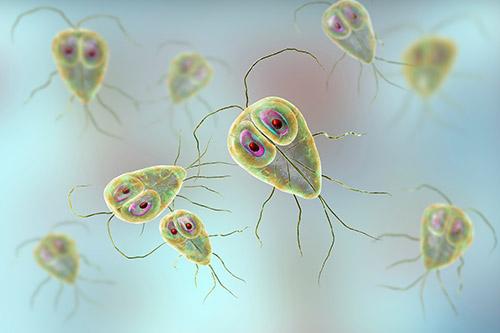
Multicellular parasites
Now let’s talk about the multicellular gut worms that you’ll have heard more about. Threadworms, pinworms, roundworms, hookworms and tapeworms are the most common helminth infections. Most worms are spread the same way as smaller parasites, through contact with infected stool which contains helminth eggs. You’re more likely to pick up a parasite in warmer, tropical countries such as sub-Saharan Africa, China, South America and Asia15.
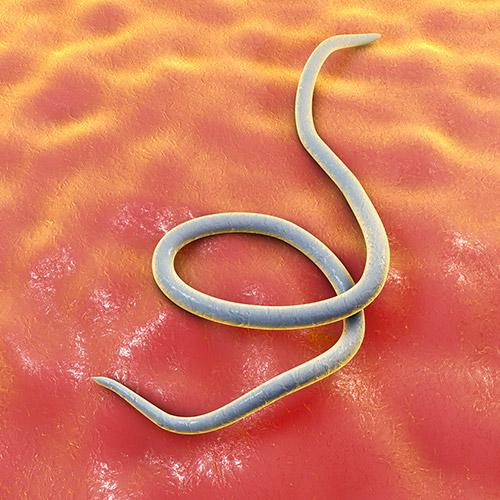
Fungi
When you hear the word “fungi”, you might first think of mushrooms. But you’ve got microscopic fungi in your gut community, too. One of these is called Candida.
If you search “Candida” online, it’ll show you a bunch of resources on how to get rid of it and how it’s a fungal yeast infection. But despite what you may read, Candida is the most commonly detected fungus in healthy human adults16. Most of us are colonised with Candida and it’s not doing us any harm17.
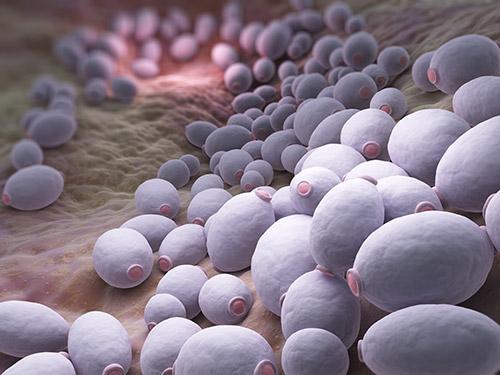
So, if you already have Candida in your body, when could it start to cause troublesome symptoms? This can happen mainly when your immune system isn’t working properly. For example, if you’re taking immunosuppressants. Also, your bacterial microbiome helps to keep Candida in check. If you take antibiotics and disrupt the normal balance of your microbiome, Candida can overgrow and become an infection18.
What are common symptoms of gut infection?
The common symptoms of gut infection tend to be similar across the different bugs. One of the biggest differences is how long the infection lasts.
Short term infection tends to be caused by bacteria and viruses. This is your classic food poisoning or “travellers’ diarrhoea” with rapid onset (“acute”), short duration of diarrhoea, vomiting, fever and feeling awful. You could also get dysentery. It’s not all bad news though. Your body is generally very good at clearing out these bacteria and viruses, which is why the symptoms are short-lived.
On the other hand, parasites often cause less severe symptoms, but your body isn’t as good at clearing the infection. This means that you can get long-lasting or “chronic” symptoms. Infections with helminth worms can often cause no symptoms at all. But with single-celled parasites like Giardia, you can get non-specific grumbling symptoms like diarrhoea, bloating, pain and generally not feeling right in yourself. If you’ve had lingering symptoms for more than a week or two, a parasite infection could be the cause.
When should I test for a gut infection?
Sudden acute symptoms
For rapid onset gut symptoms, there's often not much point in testing straight away. Your body usually clears the infection without any treatment and symptoms settle on their own. If you’ve been travelling, you could be experiencing travellers’ diarrhoea.
However, if symptoms don't settle after a few days it can be useful to test for infection in case your body needs a helping hand from some antibiotics. It can also be useful to test if a few people all come down with an infection, like food poisoning, and you're interested to know what the cause was.
In most cases though, infections are short-lived and you’ll be feeling better before you’d get your results back.
Chronic gut symptoms
It’s worth testing for a gut parasite or bacterial infection if you’re having lingering, grumbling gut symptoms that aren’t settling down. Long-term gut symptoms, going on for weeks or more, may be caused by an infection that the body is struggling to clear. A parasite, like Giardia or Cryptosporidium, may well be to blame, especially if you’ve got a history of travel to a foreign country.
How can I test myself for gut parasites and bacteria?
We offer a Gut Bacteria, Worm and Parasite Test which tests for many common bacterial and parasite infections in one go. We’ll send you one of our easy-to-use home stool collection kits and you just post the sample back to our lab.
A look at your stool sample under a microscope checks for microscopic parasites and any worm eggs. We can mainly detect roundworms, flatworms (flukes) and tapeworms. We can also sometimes detect threadworms (pinworms) in the stool, but a swab taken from the bottom is the best way to detect them. Then our lab uses a “next generation” polymerase chain reaction (PCR) based test to detect the DNA of Cryptosporidium, Giardia, Salmonella, Shigella, Campylobacter and toxic E. coli (VTEC) - all from a single stool sample.
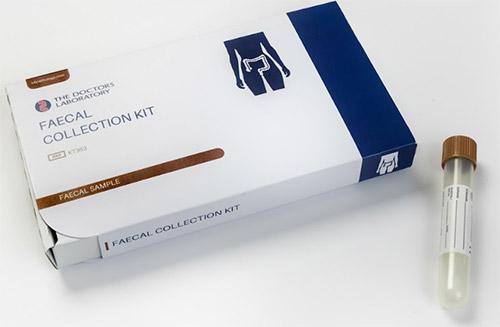
We also offer a separate test if you’re troubled by indigestion which looks for Helicobacter pylori.
If you’ve been having prolonged symptoms that you think could be caused by a gut infection, take the first step to figuring out your symptoms with our Gut Bacteria, Worm and Parasite Test. We can give you advice on the following steps to take if you test positive for one of these parasites or bacteria. Your GP can prescribe you the correct medication based on your results and help you feel back to yourself in no time.
Get tips on better health
Sign up to our emails on the better way to better health.
We'll keep you up-to-date with the latest research, expert articles and new ways to get more years of better health.


